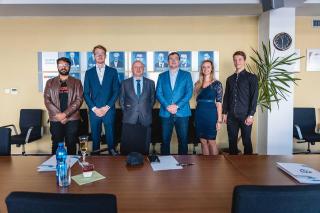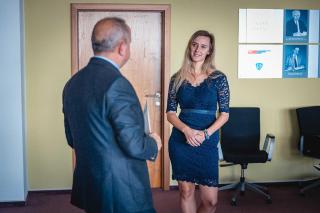Cheques were ceremonially presented to the students who succeeded in the contest PhD Talent FEEC 2021 or Why Study PhD?

With the support of the Institutional development project at the BUT, the faculty was looking for talented PhD students, who had undergone a two-round evaluation. A part of the second round was, among else, a presentation of the present and planned results before the evaluation committee. Altogether eight best of the best were found, who were awarded special stipends in a total value of 8 400 EUR.
The main awards, 3 000 EUR each, were handed over by the Dean of the faculty to the winners Jana Schwarzerová and Karel Juřík. Other six students (finalists) were awarded a special stipend of 400 CZK. The finalists are Iveta Lolová, Ali Hamza, Jan Klusáček, Filip Mívalt, Jakub Nemček, and Radek Závorka.
We congratulate the winners!

For those of you who contemplate doctoral studies we are offering the answers to the questions you may be asking yourselves right now. Let’s read the personal opinions of the present-day PhD students on what PhD studies can bring.
For what reason did you choose to continue in PhD studies?
“Ever since I was a child, I have liked to think up new things, look at the world from different angles and come up with fresh perspectives. And PhD studies has always been the way that gives me the freedom to be creative, to try and discover, to contribute to the society with something new and innovative,” says Jana Schwarzerová from DBME, one of the two main prize winners, about why she had chosen a research career.
“In the course of my master’s degree studies, I already became involved in activities at DEPE as a contractor. I learned more about the topics the department deals with and during this co-operation I realized that if I want detailed answers to some of the questions related to power engineering, studying PhD is just the thing,” Jan Klusáček explained the motive of his decision. This view is shared by Iveta Lolková, who continues with expanding her master’s thesis: “PhD studies have been a great opportunity for me to pursue further advancement in the topic of topology optimization of the line-start synchronous machines under the guidance of my present supervisor Ing. Jan Bárta, Ph.D.“
Why didn’t you choose the work in industry, although the option must have presented itself even before the start of PhD studies?
“I think that in the course of PhD studies it’s possible to gain a much wider and more diverse range of experience. The work in industry is narrowly focused on the solution of a problem itself while PhD requires dealing with the research and development in a complex manner (writing project proposals, reports, research papers, etc.). This can be used in the career in industry, for instance at managerial posts,” Karel Juřík from DTEEE clarifies. Jakub Němček adds his point of view: “Scientific work is varied and one can, to a certain extent, avoid stereotype while developing new solutions. At the same time, there are the possibilities to travel to the conferences and gain knowledge.”
What is the objective of your PhD studies? What is so interesting about it for you, what challenges does it bring and what is your topic’s potential for your career development?
“I am concerned with the study of radio channels. I have always been fascinated by the wireless transfer of information, be it between the telephones or satellite connections, and I would like to contribute to the ever higher quality, new possibilities and scientific knowledge,” Radek Závorka from the Department of Radio Electronics describes the contents of his studies. To the question where he sees himself after he completes his PhD he adds: “I can become a manager in radio departments in many industry sectors or lead a team of specialists in radio communication and development of new technologies.”
Filip Mívalt from DBME, who deals with the analysis of deep brain stimulation in patients with epilepsy, says: “I am fascinated by three things: space, ocean and brain. If my work helps at least one human being, I will consider it a success. There are many challenges, of course. What I most enjoy is the development of algorithms that enable us to conduct analyses we need for our work.” As far as future is concerned, Filip Mívalt is sure: “I am gaining invaluable experience which I will be able to utilise in the course of my scientific career. If I ever decided to go to the private sector, I do not expect that I wouldn’t find employment, since technologies of deep brain stimulation are on the upswing.”

How will the field of your studies contribute to the society and in what time horizon?
Karel Juřík engages in optimization of low-pressure plasma sources. “These sources will have two particular uses. The first is cleaning and decontamination of surfaces, vacuum chambers and samples in electron microscopes, which is also the topic of my dissertation. I have recently started to work on the second possible use of this plasma source type, namely the propulsion for low Earth orbit satellites. I assume the outcome in both fields may be visible within the following five to ten years.”
“My work is interesting from many points of view – ecology, bio refining and biotechnologies, but also medicine. I take part in the research of as yet undescribed bacteria which show a certain potential in terms of the production of butanol and oxygen as biofuels. I am also interested in bacteria which might play an important part in plastic depolymerisation. And, last but not least, my research is also concerned with antibiotic resistance of bacteria. When cooperating in international teams, I find interesting research studies concerning plants and the predictions of their behaviour in the climate change,” says Jana Schwarzerová about the future of her research and adds: “All these topics relate to the current global problems for which it is necessary to find the solutions as soon as possible.”
What does it give (and take) to study a PhD and why would you recommend it to the younger generation?
“The main thing is to realize that studying a PhD is not about being an eternal student who doesn’t want to go to work because you have to work on your research. Real projects in cooperation with private sector companies are very common here and you have to keep the deadlines and terms agreed,” says Iveta Lolová.
“On the other hand, what I feel as the biggest disadvantage is the necessity to work long hours and generally adjust your life to the studies, particularly in terms of financial expenditures. A partial financial uncertainty is, in comparison to a steady job, a part of the studies. That, however, is balanced out by the general flexibility offered by PhD studies,” Jan Klusáček sums up the disadvantages and adds: “I see PhD studies as a way to scientifically search for the answers to the questions. It definitely supports self-education and the reward is general knowledge and the capability to use it.”
“Along with the already mentioned benefits, studying a PhD contributes to the feeling that you work on something significant. You regularly meet people who are much more advanced in both knowledge and experience, and they can help your progress. On the other hand, science is very time consuming and requires dedication. There is nothing like an “ideal model” in the world. There are difficulties, of course, but if you find a “hobby” in the given field, these obstacles can be overcome and your studies lead to the thorough knowledge of the topic and its practical application,” concludes Jakub Němček, sharing his PhD study experience.
Photo: Jakub Rozboud
| Responsible person | Ing. et Ing. arch. Jana Němcová |
|---|---|
| Date of publication |


